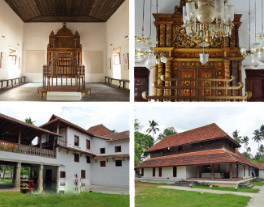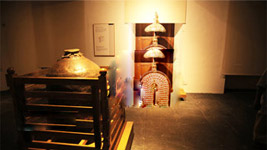The Name

There is a kaleidoscopic variety to the word "Muziris" that lends it an ever-changing dimension of beauty, and mesmerizes the modern history-enthusiast. More significantly, the different names give a peek into the varied perspectives that our ancestors, native and foreign, adopted to look at the same land and the riches it offered. According to one version, the original name was derived from a Sanskrit word Maareecham which means "a clump of pepper vines". Indeed, the land on the west coast of southern India was so rich in this exotic spice that its fame spread far and wide, and men from faraway lands were prepared to brave long and treacherous sea voyages, and trade gold in order to purchase it. Little wonder that pepper came to be known in local parlance as karuthaponnu [black gold]! According to another version, it was originally "Muchiri pattanam" (muchiri means "cleft palate" and pattanam means "town"). The name referred to a port town that was located in a fork/cleft in Periyar river. The pronunciation of the Greeks and other Westerners who came to the port on business changed it to "Muziris".
To the ancient Egyptians it was 'Machiri pattanam,' Mesori being the month they began their journey in, so as to take advantage of the monsoon winds for a safe and quick passage to the Arabian Sea. Variations of the name included "Mucirri", "Musiri", "Murachipattanam", "Marichipattanam", "Muzirikode", "Makothaipattanam", "Mahodayapattanam" and so on. In the Jewish Copper Plate of Bhaskara Ravi Varman (1000 CE) it is "Muyirikode". To the Arabs, the place was "Cyngilin" (derived from the Sanskrit word Shringhala meaning chain, as the goods were transported through a chain of canals from the sea to the hinterlands of Kerala).
However, tragedy struck in 1341 when the course of the Periyar underwent a major change, causing floods and earthquake. The result was that Muziris dropped off the trade map of the world. In his account of his voyages, Niccolo de Conti, the 15th century Italian merchant and explorer, makes a mention of the place, and in the 16th century it came to be known as Cranganore. Today, Muziris is known as Kodungallur, and is situated in Thrissur district in central Kerala.

